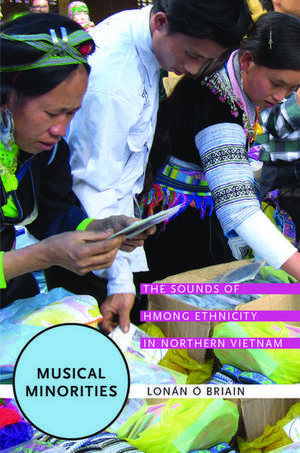Musical Minorities: The Sounds of Hmong Ethnicity in Northern Vietnam
Autor Lonán Ó Briainen Limba Engleză Hardback – 5 apr 2018
| Toate formatele și edițiile | Preț | Express |
|---|---|---|
| Paperback (1) | 230.88 lei 31-37 zile | |
| Oxford University Press – 4 apr 2018 | 230.88 lei 31-37 zile | |
| Hardback (1) | 699.91 lei 31-37 zile | |
| Oxford University Press – 5 apr 2018 | 699.91 lei 31-37 zile |
Preț: 699.91 lei
Preț vechi: 942.87 lei
-26% Nou
Puncte Express: 1050
Preț estimativ în valută:
133.94€ • 138.99$ • 111.95£
133.94€ • 138.99$ • 111.95£
Carte tipărită la comandă
Livrare economică 04-10 martie
Preluare comenzi: 021 569.72.76
Specificații
ISBN-13: 9780190626969
ISBN-10: 0190626968
Pagini: 234
Dimensiuni: 234 x 163 x 18 mm
Greutate: 0.48 kg
Editura: Oxford University Press
Colecția OUP USA
Locul publicării:New York, United States
ISBN-10: 0190626968
Pagini: 234
Dimensiuni: 234 x 163 x 18 mm
Greutate: 0.48 kg
Editura: Oxford University Press
Colecția OUP USA
Locul publicării:New York, United States
Recenzii
Lonán Ó Briain has done his homework meticulously.... [This] monograph is written in a clear prose that avoids arcane semantics. It offers a perceptive, heart-felt, and accurate analysis of the persistence of un-normalized thoughts and practices by people under strong state and market domination.... Very few such deep-rooted studies are being conducted, let alone published, on these peoples and places, making this book a must-read to anyone caring about the richness of marginal cultures and their power of resilience.
Ó Briain offers a work of great intellectual integrity and transparency, based on empirical work illustrated by case studies, discussing the research of other scholars and presenting his own interpretations based on his personal experience and his informants' perceptions. The numerous case studies, discussions of the states of the art, and the described musical analyses make the book accessible to a larger audience, from the ethnologist working in the area to others willing to learn more about Hmong and related musical cultures in Southeast Asia.
This book is a fascinating, wide-ranging and deeply intriguing account of Hmong musical and cultural life in northern Vietnam in the early years of this century. It is the product of very careful and thoughtful scholarship, sensitive fieldwork, and musical acuity. Congratulations are due to Ó Briain for producing such a valuable addition to our knowledge about the sonic world of the Hmong in northern Vietnam.
This is an important ethnographic contribution regarding the performing arts of the Southeast Asian Massif and its upland ethnic minority residents. Focusing on the music-making of an ethnic minority group in Vietnam, and based on three years of meticulous fieldwork — the permissions for which are challenging to acquire, especially for the northern borderlands where this book is based — Lonán Ó Briain is to be commended for this carefully documented account.
Musical Minorities remains a highly commendable ethnomusicological study with important ramifications for ethnic relations, tourism economies and the politics of representation in Vietnam and beyond. More than that, this book provides a model for those wishing to conduct interdisciplinary research on the performing arts of marginalised groups.
Ó Briain offers a work of great intellectual integrity and transparency, based on empirical work illustrated by case studies, discussing the research of other scholars and presenting his own interpretations based on his personal experience and his informants' perceptions. The numerous case studies, discussions of the states of the art, and the described musical analyses make the book accessible to a larger audience, from the ethnologist working in the area to others willing to learn more about Hmong and related musical cultures in Southeast Asia.
This book is a fascinating, wide-ranging and deeply intriguing account of Hmong musical and cultural life in northern Vietnam in the early years of this century. It is the product of very careful and thoughtful scholarship, sensitive fieldwork, and musical acuity. Congratulations are due to Ó Briain for producing such a valuable addition to our knowledge about the sonic world of the Hmong in northern Vietnam.
This is an important ethnographic contribution regarding the performing arts of the Southeast Asian Massif and its upland ethnic minority residents. Focusing on the music-making of an ethnic minority group in Vietnam, and based on three years of meticulous fieldwork — the permissions for which are challenging to acquire, especially for the northern borderlands where this book is based — Lonán Ó Briain is to be commended for this carefully documented account.
Musical Minorities remains a highly commendable ethnomusicological study with important ramifications for ethnic relations, tourism economies and the politics of representation in Vietnam and beyond. More than that, this book provides a model for those wishing to conduct interdisciplinary research on the performing arts of marginalised groups.
Notă biografică
Lonán Ó Briain is Assistant Professor and Director of Postgraduate Studies in Music at the University of Nottingham. Previously, he taught at the University of Birmingham and the University of Sheffield. He currently serves as reviews editor for Ethnomusicology Forum and chair of the ICTM Ireland.











